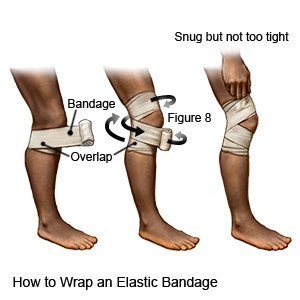Laceration Without Closure
Medically reviewed by Drugs.com. Last updated on Aug 4, 2025.
Your laceration has gone past the time to be closed. Lacerations in areas of poor blood flow usually need to be closed within 8 hours. In areas with normal blood flow, lacerations usually need to be closed within 12 hours. Facial lacerations need to be closed within 24 hours. Your wound was cleaned and a clean dressing was applied. Your laceration will heal on its own without sutures, staples, or other closure devices.
DISCHARGE INSTRUCTIONS:
Return to the emergency department if:
- You have heavy bleeding from your wound.
- You have bleeding that does not stop after 10 minutes of holding firm, direct pressure over the wound.
- Your wound has a bad smell or pus draining from it.
- You have new numbness or tingling near your wound.
Call your doctor if:
- You have a fever or chills.
- Your wound is red, warm, or swollen.
- You have pain near your wound that gets worse, even after treatment.
- Your wound is not healing, or you think an object is in the wound.
- You have questions or concerns about your condition or care.
Care for your wound as directed:
- Keep your wound dry for the first 24 to 48 hours or as directed. When your healthcare provider says you can, gently clean your wound 1 or 2 times each day with cool water. Use soap to clean the skin around your wound. Try to avoid the wound edges. Gently pat the area dry or allow it to air dry. Do not use wound cleaning solution unless directed. Do not swim or sit in a hot tub until your provider says it is okay.
- Change your bandages when they get wet, dirty, or after washing. Apply new, clean bandages as directed. Do not apply elastic bandages or tape too tightly. Do not put powders or lotions on your wound. Ask if you should apply antibacterial ointment.

- Decrease wound scarring. You may need to apply ointments to your wound or the area around it. Ask which ointment to buy and how often to use it. You may need to wait until your wound is healed. After your wound is healed, use sunscreen over the area when you are out in the sun. The skin around your wound may turn a different color if it is exposed to direct sunlight. You should do this for at least 6 months to 1 year after your injury.
Manage your symptoms:
- Apply ice to the wound to decrease swelling and pain. Apply ice to the wound for 15 to 20 minutes every hour or as directed. Use an ice pack, or put crushed ice in a plastic bag. Cover the bag with a towel before you apply it.
- Elevate your wound above the level of your heart as often as you can. This will help decrease swelling and pain. Prop the injured area on pillows or blankets to keep it elevated comfortably.
Follow up with your doctor as directed:
Write down your questions so you remember to ask them during your visits.
© Copyright Merative 2025 Information is for End User's use only and may not be sold, redistributed or otherwise used for commercial purposes.
The above information is an educational aid only. It is not intended as medical advice for individual conditions or treatments. Talk to your doctor, nurse or pharmacist before following any medical regimen to see if it is safe and effective for you.
Further information
Always consult your healthcare provider to ensure the information displayed on this page applies to your personal circumstances.
